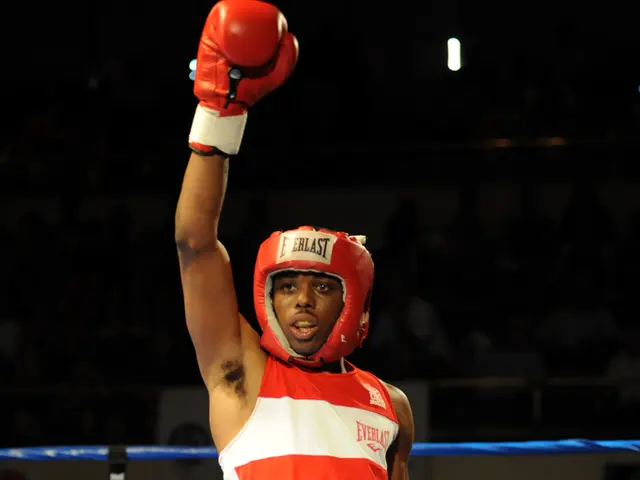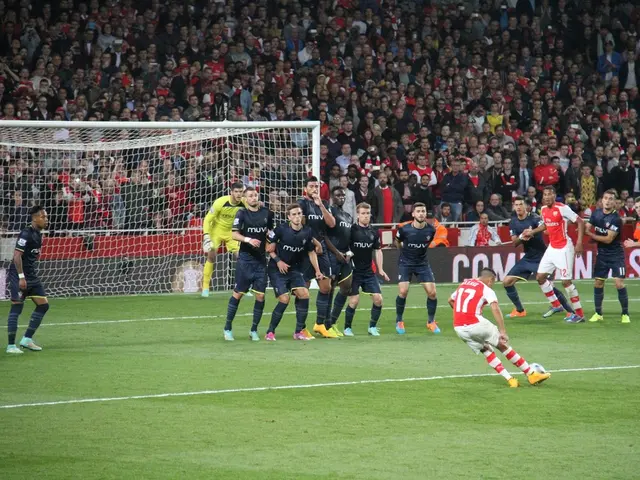Eurovision Contest Introduces New Regulations and Wellness Procedure to Prevent Artist Conflicts Based on Occult Beliefs
Hear Ye, Hear Ye! Welcome to the 2025 Eurovision Song Contest, held in diligent, buttoned-up Switzerland. They may be known for their neutral stance in international politics, but this year's edition of Eurovision proved to be anything but impartial. After 36 years of absence, Switzerland hosted a festival that left many press, fans, and performers gasping for breath, as it turned out to be the most hermetic, controlled, and restrictive event in Eurovision history.
In the name of safeguarding artists - as justified by the European Broadcasting Union (EBU) - the event was fraught with flag restrictions, controlled movements of delegations, and modified regulations for accredited press. The festival was facing a crucial time, marred by a complex international context and internal tensions. Since the expulsion of Belarus and Russia in 2021 and 2022, respectively, the contest has become inextricably linked with geopolitical events. Ukraine's victory in Turin served as a backdrop to the Russian invasion, and more recently, Israel's participation amidst the Middle East conflict added another layer of complexity.
To stir things up even further, a new factor was introduced: hermeticism. The festival organizers opted for a more reserved approach, implementing stricter restrictions on recording, accessing certain areas, and even flag display. On our website Play, one of the most popular Eurovision pre-shows, Divas Calling, failed to access the dressing room area for the first time to conduct interviews and show the delegations' spaces.
Protecting Artists: The Top Priority
The 2025 edition marked a significant shift in how the EBU handles artists' experiences. The message was clear: prioritizing the artists' well-being was of utmost importance. To this end, the role of a "well-being manager" was incorporated for the first time, serving as the central point of contact for delegations, ensuring a safe, respectful, and supportive environment for them during their time in Basel. "This is a crucial step to ensure this event evolves responsibly, focusing on the artists' experience," said Bakel Walden, president of the Eurovision Reference Group.
Camera-free zones were created, clearly distinguishing recording-permitted areas from those off-limits in rehearsals. One of these zones was the dressing rooms, now equipped with privacy curtains and no cameras, to ensure concentration and privacy before their big stage moments. "Artists are at the heart of everything we do," Martin Green, director of the Eurovision Song Contest, asserted.
The Spanish delegation strictly complied with this well-being protocol. "All delegations have followed these norms, resulting in an improved atmosphere and better coexistence," explained Ana María Bordas, head of the Spanish delegation. However, this meant that our team could no longer enter the dressing room area during rehearsals, as in previous years. "The measures designed to create a calmer atmosphere are very satisfying," Bordas concluded.
Any recording with artists required their consent and their country's press chief's approval. "We pay close attention to what we record with our representative. The EBU has stressed the importance of being careful with this aspect in our meetings with press chiefs. This year, all interviews and recordings with Melody have been coordinated through us," explained María Boj, head of the Spanish press.
A Stricter Role for the Press
The well-being protocol didn't stop with the delegations—journalists also felt the impact. Traditionally, journalists were allowed to access and disseminate images from rehearsals. That tradition, however, came to a dead end in 2025, as recording or photographing was forbidden during rehearsals to provide greater privacy for the artists.
According to David Asensio, journalist from RNE, "the limitations on entering rehearsals are detrimental to our work and also in terms of informing about what's happening here." An opinion shared by Javi Herrero from EFE: "It feels like the press room in this edition is a world apart from the action just a few meters away. This year, we haven't seen the natural interaction with artists that we had in other years."
Another standard Eurovision tradition met its demise: the press conferences after the semifinals. According to the EBU, this restructuring addressed a request from several delegations seeking to reduce the artists' media exposure during the most demanding days of the contest. Last year, during one of those press conferences, tensions reached a boiling point. Several journalists took the opportunity to confront Eden Golan, Israel's representative, about the controversy surrounding his candidacy and the protests surrounding his presence in the competition.
The Spotlight on Flags
One more area where control was tightened this year was the use of flags within the venue. While flags authorized by Swiss legislation were allowed, the visual presence of flags seemed to decrease in the stadium. Six people were even expelled during a dress rehearsal of the second semifinal for protesting with whistles and Palestinian flags during Yoav Raphael's performance, Israel's representative, while he sang "New Day Will Rise."
Switzerland's approach to the Eurovision Song Contest 2025 was marked by its strict and reserved nature. Some argue that the focus on maintaining a politically neutral environment risks stifling traditional pre-show events and interaction with artists, while others support the emphasis on taking care of participants' well-being and reducing tensions during a turbulent and sensitive period. The question remains whether this new model will become the norm moving forward or simply a one-time response to the situation. In the next few months, the Reference Group will reconvene to decide the direction Eurovision will take in the future.
Eurovision 2025: Related News
- Watch the live grand final of Eurovision 2025, minute by minute
- Where and when to watch the Eurovision 2025 grand final on TV
- The order of performance in the Eurovision 2025 final
- When will Melody perform in the Eurovision 2025 final? Here's Spain's position
- 7 artists to watch out for in Eurovision 2025
- Eurovision 2025: The odds and Spain's placement
- How to vote in the Eurovision 2025 grand final?
- The 2025 Eurovision Song Contest, with its restrictive measures, stirred debate on the balance between artist well-being and media access.
- The frequency of flag display at the contest seemed to decrease due to the strict regulations, creating a relatively subdued atmosphere.
- In the realm of entertainment, sports-betting sites showed Spain's Melody as a strong contender, offering attractive odds for her win.
- In the world of pop-culture, discussions arose about the impact of the well-being protocol on traditional pre-show events and interactions with artists.
- General news outlets covered the event extensively, providing minute-by-minute updates of the live grand final for eager spectators.
- Many believed that the controversies surrounding certain delegations, such as Israel's participation in the Middle East conflict, qualified as political news, despite the contest's attempt at neutrality.
- Sports outlets listed seven promising acts to watch out for in the Eurovision Song Contest, highlighting their potential to bring victory.
- NBA, NHL, MLB, and premier league, among other European leagues, took a break to allow fans to watch the thrilling Eurovision event.
- Baseball analysts critiqued the pause in games for the Eurovision broadcast, with some arguing it adversely affected fan interest and enjoyment.
- Hockey commentators, while intrigued by the contest, pointed out that it had little connection to their sport and thus could not draw a significant hockey audience.
- Football fans engaged in lively discussions on the platforms of social-media, expressing opinions on the impact of the Eurovision Song Contest on sports viewership and popularity.
- American sports, such as auto-racing and mixed-martial-arts, maintained steady interest amidst the European Song Contest broadcast, providing a contrast in audience preferences.
- Tennis enthusiasts, though briefly distracted from their sport, appreciated the unique experience of watching the Eurovision Song Contest, with many returning to tennis after the grand finale.








